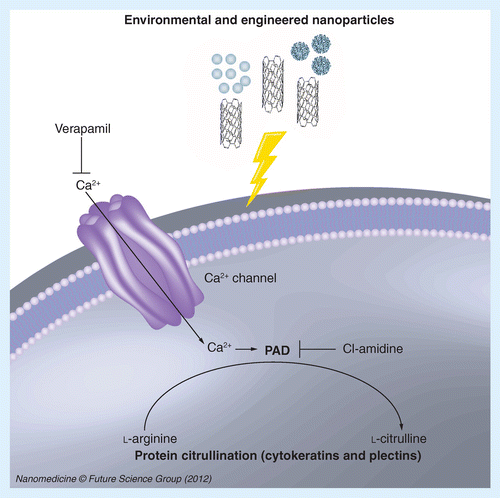Scientists from Trinity College Dublin have made a groundbreaking research, which shows that individual's health may get seriously affected when exposed to nanoparticles and this may lead to rheumatoid arthritis and other serious autoimmune disorders.
 Mechanism(s) of nanomaterials-induced protein citrullination.
Mechanism(s) of nanomaterials-induced protein citrullination.
Health and safety implications during the utilization, manufacture and disposal of nanotechnology materials have been included in the findings published recently in the 'Nanomedicine' journal. Scientists have also discovered new cellular targets for developing potential drug therapies to treat autoimmune diseases.
Researchers have found that carbon emissions from car exhaust, inhalation of dust for extended time and smoking are the risk factors, which cause chronic inflammation in the lungs. They also established the connection between smoking and rheumatoid arthritis. This research also identifies similar risks caused by nanotechnology products, which may generate new kinds of airborne pollutants that can affect global health, if not handled carefully.
The Nanomedicine and Molecular Imaging team, led by Yuri Volkov, Molecular Medicine Professor at Trinity College Dublin's School, has explored whether there is any common underlying mechanism that could play a role in the development of autoimmune disorders upon cells’ exposure to nanoparticles.
The researchers applied different techniques ranging from human cells obtained from airway passage lining and phagocytic cells to nanomaterials such as carbon nanotubes, carbon black and silicon dioxide particles of various sizes in the range of 20 to 400 nm. Meanwhile, researchers in Health Effects Laboratory Division, National Institute for Occupational Safety & Health, USA have carried out studies, wherein mice were subjected to chronic inhalation of single walled carbon nanotubes-contaminated air.
The result has shown that the nanoparticles in US and TCD studies were causing similar response in mice’s lungs and human cells, leading to the transformation of arginine amino acid into the citrulline molecule, which can trigger autoimmune diseases.
The human proteins incorporated with citrulline molecule do not function normally and are destroyed by the body’s immune system. Once the citrullinated proteins are eliminated, the immune system attacks its own organs and tissues, thereby leading to the development of autoimmune diseases.
Professor Volkov commented that interfering with the citrullination process seems to be a promising target in developing preventative and therapeutic methods for rheumatoid arthritis and other autoimmune diseases in future.
Source: http://www.tcd.ie/